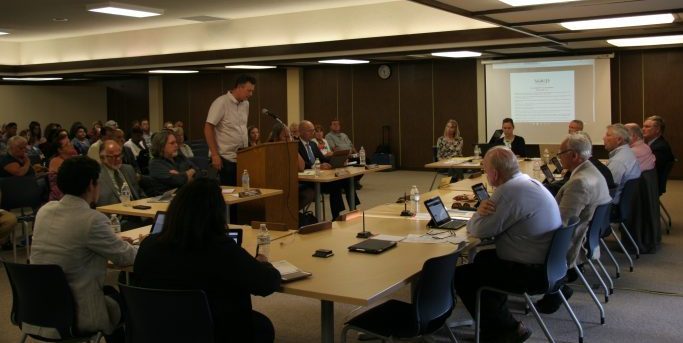
One of the more profound effects of the recent rescindment of the DACA program is a renewed fear of exposure from Dreamers. In the wake of the development, the Prospector sought out a number of interviews with those affected. Though they were impassioned to speak their feelings on the issue, the interviewees overwhelmingly opted to remain anonymous for their own safety. They have been assigned pseudonyms for clarity.

Maria is a dreamer and a student worker at one of the YCCD campuses, with a solid GPA and plans to transfer to a CSU. “DACA is a program that was introduced to us – it’s fairly new.” She explained “It was supposed to offer a sort of support system… protection from immigration and ICE – something that would prevent us from being deported. We would finally be able to get a job; we would be able to work; we would be able to get CALgrants… It opened up a lot of doors for us”
I asked her to explain to me what a dreamer was. “A dreamer is basically any Illegal immigrant that came here as a child” She said “The majority were between the age of 2 to 6 years old, so they’re children that were brought here by their parents illegally – so we really didn’t have a say, it’s not like we were like ‘no, mom and dad, we’re not gonna come here’; we had to come along, we were their kids.”
“It’s not by choice” She continued “Basically our futures were decided for us”
With the rescindment of the DACA program, the future of 800,000 dreamers have been put in limbo. Should Congress fail to pass legislation concerning the citizenship status of Dreamers, these people face deportation.
“I was 3 [the last time I was in Mexico]. I don’t know anything about it!” she said “It’s like putting someone in a room full of strangers – it’s going to be hard for you to adapt and start talking to them and building conversation, let alone just being dropped in a foreign country. Some don’t even know the language.”
Despite these individuals’ upbringing in America, they don’t possess either citizen or resident status, and there is currently no reasonable path in place for them to attain citizenship. Without the temporarily protected status offered by the DACA program, they are being left extremely vulnerable.
“Once they remove the DACA, after our work permit expires, we’re basically being exposed, and if we get pulled over for the dumbest thing… we could be sent back any second,” She said.
The irony being the DACA program (which was originally established to help these individuals pursue brighter futures in America) has become a government registry of dreamers – which makes them low-hanging fruit for an increasingly aggressive ICE agency.
“They have all of our information” She said “Before this they didn’t have any information from us because – y’know – we weren’t exposed. Every person that has applied for the DACA, they have all of our information, so if they really wanted to they can come at us any time of the day.”
“I know that some people are scared about that – I know that they said they aren’t going to use our information for stuff like that, but I mean – nowadays you really don’t know; everything that’s been going on is all so sketchy.”
In light of these developments, it is critical for dreamers that something gets done on their behalf – whether that means the adoption of legislation that provides a pathway to citizenship, or if that means enshrining DACA into law.
Local Professor Speaks Out
Professor Brian Condrey was one of many speakers at the most recent YCCD Board of Trustees meeting. He advocated for a humane approach to the plight of dreamers and the undocumented community as a whole. “We have a mission and that mission is to serve our communities,” he said “and undocumented people are part of our communities. I think this is the biggest moral issue of our day as educators.”
“It’s a community college; it’s committed to open access. We should be serving them and doing everything we can, because they are our community and our students.” He continued “I think it’s right for us to argue for Dreamers and talk about how they’re exceptional, but what happens in doing that is we often throw non-DACA people under the bus.”
Indeed, a lot of the conversation surrounding DACA revolves around the immigration issue as a whole, with some arguments hinging on a presuposition that immigrants as a class are undesirable people. “The question I would ask is ‘Who raised them?'” He continued “In many cases, they were raised by undocumented people, and so… I’m glad that we’re talking all these positive ways about DACA students, but at the same time there’s this tendency to demonize and criminalize what their parents did – and all their parents did is they brought them here for a better life.”
“They came here because – in the case of our local economy – we need undocumented labor.” He said “They’re not here to put one over on anybody, or this suggestion that their kids are clean, but they’re criminals – that really offends me.”
“For decades we’ve relied on people coming here from these countries to escape poverty and all these things, but they’re coming here because we need them – because there’s a demand for their labor” He continued “And we’re more than happy to exploit that labor, but when it comes to fulfilling our promises to their children and treating them fairly and not demonizing them, we treat them like they’ve robbed us or something.”
Dreamer Talks Family and Coming to America

Sabrina is a current YCCD student majoring in criminal justice. She elaborated on how her family arrived and what was in their hearts and heads when they decided to stay.
“My dad was 19 when he first came over here,” she began. “He was working; he was just supposed to come out here to work and make money because times were tough in Mexico back then.”
“He came out here while my mom was pregnant in Mexico with me,” she continued “It was a thing that was just supposed to be for a couple months and… he’s been here for like 22 years now.”
“He realized how much money he was making here,” she said “and he realized… ‘maybe its better if my family comes over here, and I can provide better for them.’ So… we came over here – well I did first, and then my mom was brought over here with the coyote.”
“I was brought on a plane,” she explained “they used one of my cousin’s papers – I was a baby, I was 5 months old, so… they couldn’t even tell the difference between the baby’s face and… they just brought me here on a plane, under somebody else’s papers and stuff, so… that’s how I got here.”
When she mentioned that her father’s been here for 22 years now, it prompted a question about the process for applying for citizenship, the difficulties of it, and why he’s chosen not to pursue it in that time.
“My uncles that we came to live with here… one of them did that, but it was a very long process, and what they asked for was proof that he owned land in Mexico of some kind to show that… he had some wealth or something.”
“My parents never owned anything over there,” she continued “so he knew that they were going to ask for that; he knew they were going to ask for multiple things that they didn’t have yet, and it was a very long process.”
“My uncle” she explained “it took him 15 years to get his citizenship, and he’s been here since longer than we have…” she paused “I… don’t mind when people say ‘ok well do things the right way; there’s laws and stuff,’ I get that, y’know – I’m… majoring in criminal justice – law enforcement – so I know that there’s laws that we have to follow and stuff but, the thing is, people don’t realize that it takes a very long time; it takes a really, really long time – and then there’s so many requirements that people don’t have.”
“People leave their countries with the purpose of… ‘ok this is very poor; I don’t have enough to feed my family.’ – right now I think a full day of work in Mexico is $8,” she elaborated “…a full day.”
“It’s not all about the money, or nothin’ like that, but you don’t really think about fixing citizenships and going through that fifteen/twenty/twenty-five year process, y’know… going through all that at the same time that you’re trying to just make sure that your family’s good.”
The topic of deportation came up again, what her history is with Mexico and what it would look like for her if she were to be deported.
“It’s weird to me because, y’know, I was – I grew up here; I don’t know anything about my country.”
She continued “…I mean I know from the stories that my parents tell me, and the times I’ve talked to my grandparents on the phone, and my uncles and aunts in Mexico and stuff – but I don’t know what it looks like.”
“I’ve never been there except when I was born, and I was a baby – I can’t remember anything.” She said “my whole life I’ve known California; my whole life, this is all I know… I take full pride in being full Mexican, but also living here, growing up here, seeing my brother and sister grow up here – I also feel American.”
Fear and Uncertainty
There is an acute risk present only to the youngest and most recent beneficiaries of DACA. Students that have just graduated highschool and have the longest pathway to a degree have been put in a particularly uncomfortable situation.
The transitional period between secondary and postsecondary education is unsettling enough, let alone the added stress of wondering if you’re still going to be a legally protected resident in the next six months.
Interviewing a third anonymous dreamer, Anjelica, revealed the destructive uncertainty caused by the rescindment.

“If I lose DACA, I’d lose my job. If I lose my job, I’ll probably drop out,” she began.
“I’m the first graduate from my family… I don’t get how they’re putting us on a time limit – I don’t know what’s going to happen in six months.”
For students like Anjelica, the benfits of pursuing college would be effectively negated, should protections like DACA vanish. Even with a college degree (an expensive college degree), any work opportunities that require that degree would also require citizenship status to be established.
“That’s kind of stressing me out because – what if I’m just coming to school wasting my time?”
When DACA was first announced, it prompted hundreds of thousands (nearly a million) citizens to come forward and provide information in order to pursue the American Dream. With its rotections threatened, so to are the futures of these people threatened – both in that the prospects of their futures will be stymied by beurocracy, and in the fact that they will be easy targets for an increasingly aggressive Immigration and Customs Enforcement Agency.
We can only hope that some positive developments occur as Congress attempts to tackle this issue.
Note: This article was featured in the Fall 2017 print edition of The Prospector.
Comment Policy: Comments are welcomed and encouraged. However, the editorial board reserves the right to edit or delete, without notice, any comments submitted to the blog. For more details, see our full Comment Policy.